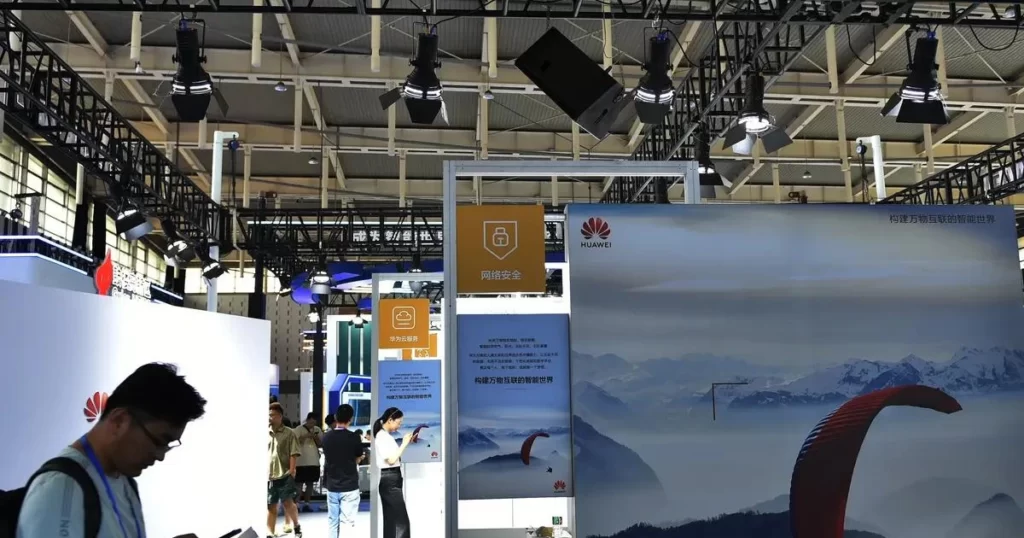Huawei Accused of Building Secret Chip Factories to Bypass US Sanctions
The Semiconductor Industry Association (SIA), a trade group representing chipmakers, has accused Huawei of building a network of secret semiconductor fabs in China.
SIA stated that Huawei has built three new factories and purchased two existing ones. To aid it, the government has also given it subsidies totalling almost $30 billion.
Independent verification of the SIA report is lacking, and Huawei has refuted the accusations. The story has sparked worries, meanwhile, that Huawei may be attempting to get around US penalties that were placed on the business in 2019.
US Sanctions Prohibit Huawei from Buying US-Made Chips

Huawei is not allowed to purchase semiconductors or other technology manufactured in the US due to US restrictions. Huawei finds it challenging to produce its own smartphones and other goods as a result.
Huawei would be able to build semiconductors independently of US technology thanks to the secret fabs.
The latest indication of the rising rivalry between China and the United States in the semiconductor business is the report from the SIA. Chip production is dominated in the US, but China is coming up quickly.
The Chinese government has invested billions of dollars in subsidies and investment in the semiconductor sector, which it has prioritized.
What is the US government’s concern?
The US administration fears that China may become a danger to national security as a result of its increasing dominance in the semiconductor sector. These worries have been reinforced by the SIA’s findings.
The US-China semiconductor competition would see a significant shift if Huawei’s hidden factories are genuine. Additionally, they would be a blow to the US government’s efforts to get Huawei to sever its connections to the Chinese government.
The efficacy of the US sanctions against Huawei has also come under scrutiny following the release of the SIA report. Huawei will be less affected by the penalties if it can manufacture its own processors.
Probably, the US government will keep applying pressure to Huawei and other Chinese enterprises that it considers to be a danger to national security. China, according to the SIA research, is adamant about growing its own semiconductor sector, regardless of the expense.
The US-China semiconductor competition may yet have undetermined results. Nevertheless, it is evident that the two nations are involved in a significant technical rivalry that might influence the future course of the world economy.
Who supplies chips to Huawei?
Taiwan’s TSMC was Huawei’s primary chip supplier prior to the US penalties. As the top contract chipmaker in the world, TSMC makes semiconductors for several of the top tech firms in the world, such as Nvidia, Qualcomm, and Apple.
However, TSMC is no longer able to provide semiconductors to Huawei because of the US restrictions. The inability of Huawei to produce its own smartphones and other goods has had a major negative effect on the company’s operations.
While it has been challenging, Huawei has been looking for other chip suppliers. China’s semiconductor sector has been supported by the government, but it will take some time for the nation to achieve chip self-sufficiency.
Huawei will probably keep running into problems obtaining the processors it needs in the interim. This can make it more difficult for the business to compete on the international stage.
Here are some other chip suppliers that Huawei is reportedly working with:
- Semiconductor Manufacturing International Corporation (SMIC)
- United Microelectronics Corporation (UMC)
- Nexperia
It is also possible that Huawei will start producing its own chips in the future. The company has been investing in chip design and manufacturing, and it has the resources to do so. However, it will take time for Huawei to develop its own chipmaking capabilities.
Huawei’s secret semiconductor fabs
It has been revealed that Huawei is constructing covert semiconductor plants in China, perhaps evading US sanctions. This was posted by the Semiconductor Industry Association (SIA), however it’s not verified.
Reactions to the SIA report have been conflicting. Some analysts think Huawei is establishing covert factories and that the information is genuine. Some people think that Huawei is only investing in its chip-making expertise and that the report is overly dramatic.
The reality probably lies in the middle. Huawei could be developing covert factories, but there’s also a chance the story is overblown. The truth will only become clear with time.
The significance of Huawei’s secret fabs cannot be overstated. Being able to make its own chips would allow Huawei to become less dependent on US technology and would offer it a significant competitive edge in the world market. Additionally, this may make the semiconductor business more competitive, which would be good for consumers.
But the US’s national security may potentially be at risk from the secret fabs. Huawei may be able to provide semiconductors that are utilized in sensitive applications—like military hardware—giving China the upper hand over the US. For this reason, the actions of Huawei are of great concern to the US government.
The US-China semiconductor rivalry is likely to continue for many years to come. The secret fabs are just one part of this rivalry, and it remains to be seen how it will all play out.
Also Read Ancient whale, aged 41 million years, christened in honor of renowned diminutive ruler.




One Comment